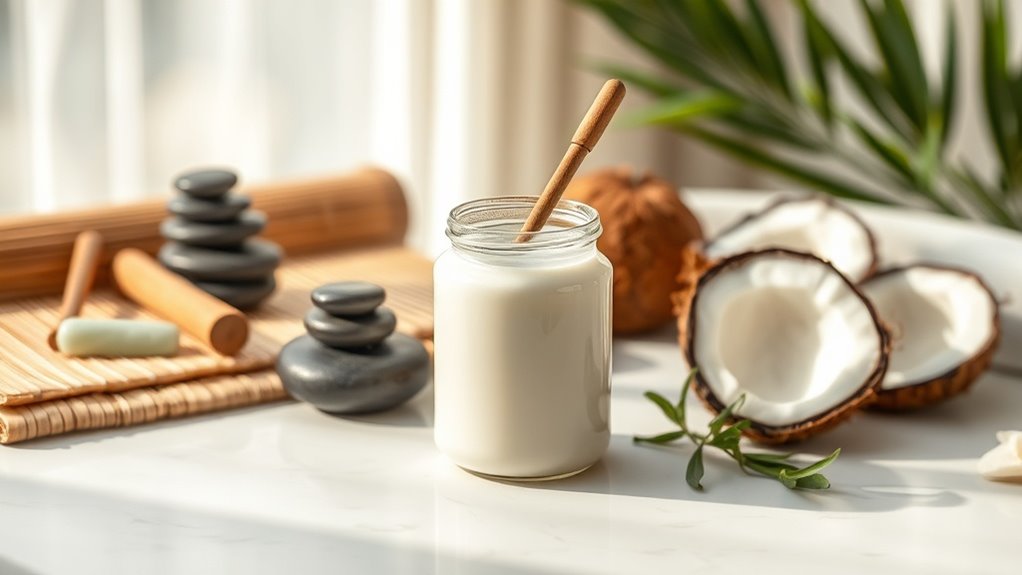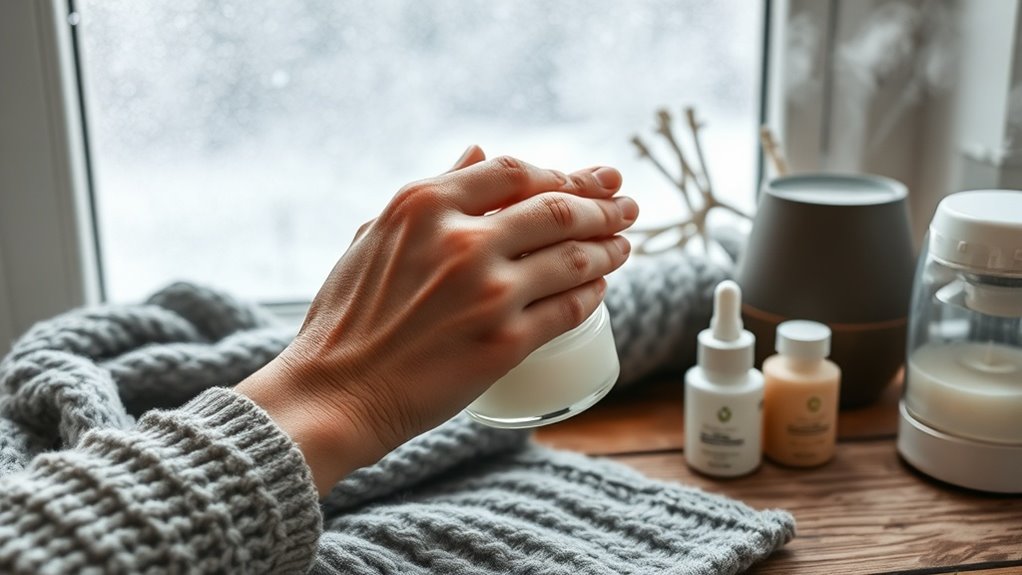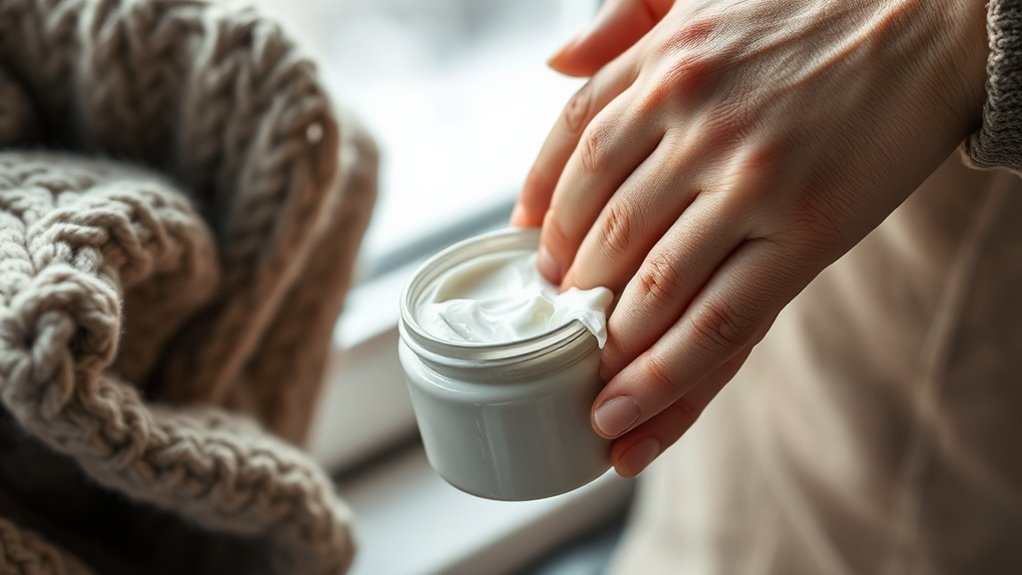Uncover the Best Bloating Relief Trick Ever!
You’ll find instant relief from bloating with a simple yet powerful massage technique. Start at your right hip bone and move your fingers in a clockwise direction across your lower belly, applying gentle pressure as you go up, across, and down to your left hip. Continue this motion for 5-10 minutes while taking deep breaths. This targeted approach helps release trapped gas and stimulates proper digestion. Discover more proven strategies to banish bloating for good.
Key Takeaways
-
Gentle abdominal massage in clockwise direction for 5-10 minutes while deep breathing provides quick relief from trapped gas.
-
Sipping warm ginger or peppermint tea relaxes digestive muscles and reduces inflammation naturally.
-
Simple knee-to-chest and cat-cow stretches help release trapped gas and ease bloating discomfort.
-
Consuming probiotic-rich foods like yogurt helps restore gut bacteria balance and reduces bloating over time.
-
Practicing mindful eating by chewing slowly and avoiding distractions prevents excess air swallowing during meals.
What Really Causes Bloating: Understanding the Root Issues
While many people blame their bloating on overeating, several lesser-known factors often contribute to this uncomfortable condition. You might be surprised to learn that food sensitivities, poor gut bacteria balance, and even stress can trigger a bloated belly.
If you’re like many others searching for bloated belly remedies, understanding these root causes is your first step toward relief.
Your digestive system’s health plays an essential role. Common triggers include consuming too many FODMAPs (fermentable carbohydrates), swallowing excess air while eating, and hormonal fluctuations.
You’re not alone if you’ve noticed bloating after drinking carbonated beverages or eating foods high in sodium. Sometimes, the culprit might be as simple as eating too quickly or not staying properly hydrated throughout the day.
The Science Behind Digestive Discomfort and Gas
Understanding bloating requires a closer look at your digestive system’s mechanics. When you eat, your digestive tract breaks down food through a complex process involving enzymes, bacteria, and muscular contractions.
Your gut bacteria produce gas as they ferment certain foods, especially carbohydrates and fiber.
You’re not alone if you notice more gas and discomfort after eating foods like beans, dairy, or cruciferous vegetables. These foods contain specific compounds that many people’s bodies struggle to break down efficiently.
What’s happening is that undigested food particles reach your large intestine, where bacteria feast on them, creating excess gas as a byproduct. This buildup of gas stretches your intestinal walls, triggering those uncomfortable bloating sensations you’re all too familiar with.
Immediate Relief: The Game-Changing Massage Technique
Need fast relief from bloating? You’ll love this simple yet effective massage technique that countless others have discovered.
Here’s how to perform it: lie on your back, place your hands on your lower belly, and apply gentle pressure in a clockwise direction. Start at your right hip bone, move up toward your ribs, across to your left side, and down toward your left hip.
Continue this circular motion for 5-10 minutes, breathing deeply as you massage. This technique helps move trapped gas through your digestive system while stimulating your body’s natural digestive processes.
You’re not just temporarily masking discomfort – you’re actively helping your body resolve the bloating. Many people report feeling relief within minutes of trying this proven method.
Top Foods That Fight Bloating Naturally
Beyond massage techniques, certain foods can actively combat bloating and support your digestive health. You’ll find relief by incorporating ginger, which reduces inflammation and eases digestive discomfort.
Peppermint tea works wonders to relax your digestive muscles and release trapped gas, while yogurt’s probiotics restore healthy gut bacteria balance.
Add potassium-rich bananas to your diet to counteract sodium’s bloating effects, and try fennel seeds to soothe your digestive system naturally.
Pineapple contains bromelain, an enzyme that breaks down proteins and reduces inflammation. If you’re dealing with water retention, cucumber’s high water content and natural diuretic properties will help flush out excess fluids.
These foods aren’t just healthy additions to your meals – they’re your allies in maintaining a comfortable, bloat-free digestive system.
Foods to Avoid When Feeling Bloated
Several common foods can worsen bloating and should be avoided when you’re feeling uncomfortable.
Steer clear of dairy products like milk, cheese, and ice cream, especially if you’re lactose intolerant. You’ll also want to skip carbonated beverages, which introduce extra gas into your digestive system.
Cut back on high-sodium processed foods that cause water retention, including canned soups, chips, and frozen meals.
Cruciferous vegetables like broccoli, cauliflower, and cabbage can trigger bloating due to their complex carbohydrates.
While beans and lentils are nutritious, they’re known to cause gas and bloating in many people.
Stay away from sugar alcohols found in sugar-free gum and candy, as they’re difficult for your body to digest.
Essential Oils and Herbs for Digestive Health
Natural essential oils and herbs offer powerful relief for bloating and digestive discomfort.
You’ll find that peppermint oil can ease stomach cramps and reduce gas, while ginger oil helps combat nausea and improves digestion. Fennel oil is your go-to remedy for reducing bloating and supporting healthy gut function.
When it comes to herbs, you can’t go wrong with chamomile tea, which soothes your digestive system and reduces inflammation.
Turmeric’s active compound, curcumin, works wonders for gut health, while caraway seeds help break down difficult-to-digest foods.
Add these to your daily routine by mixing a few drops of essential oil in carrier oil for gentle stomach massage, or brewing fresh herbal teas.
You’re just steps away from better digestive health with these natural solutions.
The Role of Probiotics in Preventing Bloat
While herbal remedies offer immediate relief, probiotics work as your long-term defense against bloating. These beneficial bacteria help restore balance to your gut microbiome, making you less susceptible to digestive issues.
You’ll find that regularly consuming probiotics strengthens your digestive system’s ability to break down food efficiently. Look for probiotic supplements containing Lactobacillus and Bifidobacterium strains, or add fermented foods like yogurt, kefir, and kimchi to your daily meals.
Start with small amounts and gradually increase your intake to avoid any initial digestive discomfort. You’re not alone in this journey – millions have discovered that probiotics can transform their gut health.
Within a few weeks of consistent use, you’ll likely notice less bloating, improved regularity, and better overall digestion.
Simple Exercise Moves to Release Trapped Gas
Four gentle exercises can help provide quick relief from uncomfortable bloating and trapped gas.
Start by lying on your back and doing the knee-to-chest pose – slowly pull one knee at a time toward your chest, holding each position for 30 seconds.
Next, try cat-cow stretches on your hands and knees, alternating between arching and rounding your back.
You’ll also want to perform gentle twists while seated, rotating your torso from side to side.
Finally, try the wind-relieving pose by lying flat and hugging both knees to your chest while gently rocking side to side.
These moves work by massaging your digestive system and encouraging trapped gas to move through your intestines naturally.
Remember to breathe deeply during each exercise for maximum benefit.
Hydration Habits That Reduce Bloating
Staying properly hydrated throughout the day can considerably reduce uncomfortable bloating and gas.
You’ll want to drink water consistently rather than gulping large amounts at once, which can make bloating worse. Aim for 8-10 cups daily, spacing them evenly between meals.
Like many of us trying to beat bloat, you’ll get better results by avoiding carbonated drinks and using a straw, both of which can trap excess air in your digestive system.
Start your morning with warm lemon water to stimulate digestion, and consider incorporating hydrating foods like cucumber and watermelon into your diet.
If plain water isn’t your thing, you’re not alone – try infusing it with mint leaves or ginger slices, which can also help ease digestive discomfort.
Stress and Your Digestive System: The Hidden Connection
Beyond proper hydration, your stress levels play a major role in digestive health. When you’re anxious or overwhelmed, your body activates its “fight or flight” response, which diverts blood flow away from your digestive system and can trigger bloating, cramping, and irregular bowel movements.
You’re not alone if you’ve noticed your stomach acting up during stressful times. Your gut and brain communicate constantly through the vagus nerve, creating what experts call the gut-brain axis. This connection explains why you might feel butterflies before a presentation or lose your appetite during difficult situations.
To combat stress-related bloating, try deep breathing exercises, gentle yoga, or a five-minute meditation. These practices activate your body’s relaxation response, allowing your digestive system to function efficiently and reduce uncomfortable bloating symptoms.
Mindful Eating Practices for Better Digestion
How you eat can be just as important as what you eat when it comes to preventing bloating. By practicing mindful eating, you’ll join countless others who’ve discovered the secret to better digestion and a happier gut.
| Mindful Practice | Benefits | Action Steps |
|---|---|---|
| Slow Eating | Less air swallowed | Chew 20-30 times per bite |
| No Distractions | Better digestion | Put away your phone |
| Portion Control | Reduced overload | Use smaller plates |
| Present Moment | Stress reduction | Focus on each bite |
You’ll notice immediate improvements when you start eating mindfully. Take time to savor each bite, listen to your body’s hunger signals, and create a peaceful eating environment. Remember, you’re not alone in this journey – thousands have transformed their digestive health through these simple yet powerful practices.
Traditional Remedies From Around the World
Ancient wisdom offers proven bloating remedies that have stood the test of time. In India, you’ll find people sipping on cumin-spiced water, while Chinese households rely on ginger tea to calm upset stomachs.
Across the Mediterranean, fennel seeds have been a trusted after-meal tradition for generations. You can easily incorporate these time-tested solutions into your daily routine.
Try brewing a cup of chamomile tea, a beloved German digestive aid, or adopt the Japanese practice of drinking warm water with umeboshi (pickled plum).
Mexican culture offers té de manzanilla (chamomile tea) with a hint of mint, while Scandinavian traditions recommend caraway seeds to combat bloating.
These traditional remedies aren’t just folklore – they’re backed by centuries of use and, increasingly, by modern science.
When to Seek Medical Help for Chronic Bloating
While occasional bloating is normal, persistent symptoms lasting more than three weeks should prompt a visit to your healthcare provider.
You’ll want to seek immediate medical attention if your bloating comes with severe abdominal pain, blood in stools, unexplained weight loss, or frequent vomiting.
Don’t ignore these additional warning signs: difficulty eating or feeling full quickly, changes in bowel habits, persistent heartburn, or unusual fatigue.
These symptoms could indicate underlying conditions like celiac disease, inflammatory bowel disease, or even ovarian cancer in women.
Natural Supplements That Aid Digestion
Looking for natural digestive support? You’re not alone – many people turn to supplements to ease their bloating discomfort. Several proven options can help improve your digestion naturally.
Probiotics support your gut’s healthy bacteria balance, while digestive enzymes help break down food more efficiently. Peppermint oil capsules can relax your digestive muscles and reduce bloating. Ginger supplements are excellent for calming nausea and promoting healthy digestion.
Other effective supplements include fennel seed extract, which reduces gas, and artichoke leaf extract, which supports bile production for better fat digestion.
L-glutamine can help repair your gut lining, while magnesium helps relax digestive muscles and promote regular bowel movements.
Always start with one supplement at a time and consult your healthcare provider before adding new supplements to your routine.
Creating a Daily Anti-Bloat Routine
Establishing a consistent daily routine can greatly reduce bloating and improve your digestive health. Start your morning with a warm glass of lemon water and practice mindful eating throughout the day.
You’ll want to chew slowly and sit upright while dining. Set regular mealtimes and don’t skip breakfast – your body thrives on consistency. Schedule your main meals 3-4 hours apart, and avoid eating late at night.
Between meals, try taking short walks to promote digestion. You’re going to feel better when you incorporate stress-reducing activities like yoga or meditation.
Track your food intake and note which combinations trigger discomfort. When you identify your personal bloating triggers, you’ll be able to adjust your diet accordingly.
Remember to stay hydrated and aim for at least seven hours of quality sleep.
Time-Tested Kitchen Remedies for Quick Relief
When bloating strikes, your kitchen likely contains several natural remedies that can provide quick relief.
Try steeping fresh ginger slices in hot water for a soothing tea that calms your digestive system. You’ll also find that peppermint leaves make an effective anti-bloat brew, while fennel seeds can be chewed raw or made into a tea.
Keep lemon and apple cider vinegar on hand – a tablespoon of either in warm water helps break down trapped gas.
If you’re feeling especially uncomfortable, reach for your spice rack and mix 1/4 teaspoon of turmeric with warm water.
Many people swear by activated charcoal capsules too, which you can store in your pantry for those moments when you need fast digestive support.
The Impact of Sleep on Digestive Health
Although many people focus solely on diet and exercise, quality sleep plays an essential role in managing bloating and overall digestive health.
When you’re sleep-deprived, your body’s natural digestive rhythm gets disrupted, leading to increased inflammation and digestive discomfort.
You’ll notice that getting 7-9 hours of quality sleep helps regulate your gut hormones and supports healthy digestion.
Your body repairs and regenerates digestive tissue during deep sleep phases, which can reduce bloating and discomfort the next day.
Try establishing a consistent sleep schedule and creating a relaxing bedtime routine to maximize these benefits.
If you’re struggling with chronic bloating, improving your sleep habits might be the missing piece you’ve been looking for.
Long-Term Lifestyle Changes for Permanent Relief
To achieve lasting relief from bloating, you’ll need to implement sustainable changes rather than quick fixes. Start by joining the growing community of mindful eaters who prioritize regular meal times and proper portion control.
You’ll find success by incorporating fiber-rich foods gradually while staying well-hydrated throughout the day.
Make movement a daily habit – even a 15-minute walk after meals can improve digestion and reduce bloating. Join a yoga class or follow online workouts that focus on core-strengthening poses known to aid digestion.
Track your food triggers in a journal, just as many others have found success doing, and work with your body’s natural rhythm by eating when you’re truly hungry and stopping before you’re overly full.
Frequently Asked Questions
Can Bloating Affect Fertility or Menstrual Cycles?
Yes, your bloating can affect both fertility and menstrual cycles. When you’re bloated, hormonal imbalances can disrupt ovulation timing and make your periods irregular, impacting your reproductive health.
Why Do Some People Bloat More During Air Travel?
You’ll bloat more during flights because cabin pressure changes cause gases in your body to expand, while sitting for long periods and eating salty airplane food worsens fluid retention.
Does Wearing Tight Clothing Make Bloating Worse?
Yes, your tight clothes can make bloating feel worse by compressing your abdomen and restricting natural digestion. You’ll feel more comfortable wearing loose-fitting outfits when you’re dealing with bloating.
Are There Specific Breathing Exercises That Help Reduce Bloating?
You’ll find relief through diaphragmatic breathing exercises. Take slow, deep breaths into your belly for 5 counts, hold briefly, then exhale for 7 counts. Repeat this 10 times.
Can Certain Medications Cause or Worsen Bloating Symptoms?
You’ll find that many medications, like antacids, iron supplements, and some antibiotics, can trigger bloating. Birth control pills and anti-inflammatory drugs might also make your symptoms worse. Always consult your doctor.





